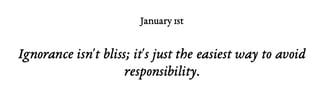Ignorance isn't bliss; it's just the easiest way to avoid responsibility.
1/2/20252 min read


Embracing Our Narratives: A New Year’s Reflection on Truth and Power
January 1st, 2025
As the calendar flips to a fresh start, January 1st always feels like a blank page—a moment to reflect on the past and set intentions for the year ahead. For many, it’s a time of resolutions, chasing self-improvement, and facing truths about where we’ve been and where we’re going. But what if, instead of staring down every harsh reality, we chose to craft our own stories? What if the key to a more empowered life lies not in unfiltered truth, but in the narratives we build for ourselves?
In an excerpt from my book, shared in the image above, I dive into this very idea. The piece, titled “Ignorance isn’t bliss; it’s just the easiest way to avoid responsibility,” explores how fiction can be a powerful tool in a world where facts often weigh us down. The text paints truth as a “harsh light” that reveals our flaws and the chaos of reality. Yet, it argues, by shaping our own narratives, we can make life not just bearable, but enjoyable—on our own terms.
The Power of a Chosen Story
Consider this scenario from the excerpt: You’ve built a successful career, only to realize much of it might be due to luck rather than pure talent. The truth stings—it’s unsettling to think your achievements might not fully belong to you. But what if, instead, you meditate on a different story? One where your hard work, grit, and genius are the real drivers of your success. This isn’t about burying your head in the sand; it’s about choosing comfort over confrontation, empowerment over doubt.
The piece takes this further, suggesting that when life throws unflattering truths our way—maybe a failing relationship or a personal shortcoming—we can reframe the narrative. Picture yourself as the hero, not the victim. In that struggling relationship, you might tell yourself the fault lies elsewhere or that it’s just a temporary storm. This approach, while tinged with cynicism, offers a shield against despair and a way to reclaim control.
Reality as a Malleable Canvas
At its heart, the excerpt asserts that our narratives hold immense power. How we feel, what we perceive, and even what we call “reality” bend to the stories we tell ourselves. It’s a bold claim: “Reality is malleable, shaped by the stories individuals tell themselves.” By embracing this, we turn cynicism into a strength and deception into an art form. The piece ends with a question that lingers: “In the end, what is truth but a consensus we choose to agree upon?” It’s a nudge to rethink truth not as a fixed point, but as something we can negotiate.
A New Year, A New Narrative
So, as we stand on the threshold of this new year, I invite you to reflect on your own stories. Think back to a moment when you faced a tough truth—how did you cope? Did you find peace by shifting the narrative? Maybe you’ve told yourself “I’m not failing; I’m just learning” or “This setback is setting me up for something bigger.” These aren’t just platitudes—they’re acts of creation.
This January 1st, let’s not only set goals but also examine the tales we carry. Are they lifting us up or holding us back? The beauty of this perspective is that we’re not powerless against reality—we’re its co-authors. So, what story will you tell yourself this year? Will you embrace the harsh light of truth, or craft a narrative that lights your way forward?
Skepticism
Embrace the absurd, question the ordinary daily.
Contact us
Reflection
© 2025. All rights reserved.
